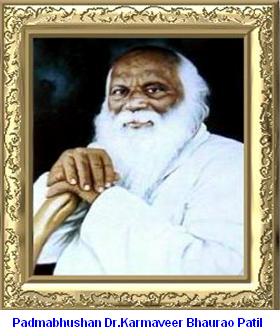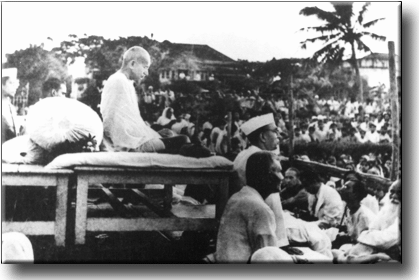 Dr. Karmaveer Bhaurao Patil was born on 22 September, 1887 at Kumbhoj, in the Kolhapur district of Maharashtra. His native place is Aitawade Budruk., Dist. Sangli. He came from the tenacious Jain family but rejected its rigorous religious rites and fought all his life against the social ills that impede the secularist growth of society. During his school days, he came under the direct influence of the then king of Kolhapur, Rajarshi Chh. Shahu Maharaj who was a staunch advocate of social equality and great promoter of education for the backward communities of Maharashtra. Another great social reformer from whom, he drew inspiration was Mahatma Jyotirao Phule. While working at Ogales, Kirloskars and Coopers, Bhaurao would save his time to devote himself to the activities of Satya-Shodhak Samaj.He would perform Satya Shodhaki Jalasas in the villages of Maharashtra and awaken the people to the dire consequences of the social evils of the time.He realised that the social ills could be remedied through the education of the masses alone and so laid the foundation of the Rayat Shikshan Sanstha by opening a Boarding House at Kale (Tal-Karad, Dist-Satara) in 1919. Soon, however, in 1924 he shifted the head-quarters of his educational institution to Satara.
Dr. Karmaveer Bhaurao Patil was born on 22 September, 1887 at Kumbhoj, in the Kolhapur district of Maharashtra. His native place is Aitawade Budruk., Dist. Sangli. He came from the tenacious Jain family but rejected its rigorous religious rites and fought all his life against the social ills that impede the secularist growth of society. During his school days, he came under the direct influence of the then king of Kolhapur, Rajarshi Chh. Shahu Maharaj who was a staunch advocate of social equality and great promoter of education for the backward communities of Maharashtra. Another great social reformer from whom, he drew inspiration was Mahatma Jyotirao Phule. While working at Ogales, Kirloskars and Coopers, Bhaurao would save his time to devote himself to the activities of Satya-Shodhak Samaj.He would perform Satya Shodhaki Jalasas in the villages of Maharashtra and awaken the people to the dire consequences of the social evils of the time.He realised that the social ills could be remedied through the education of the masses alone and so laid the foundation of the Rayat Shikshan Sanstha by opening a Boarding House at Kale (Tal-Karad, Dist-Satara) in 1919. Soon, however, in 1924 he shifted the head-quarters of his educational institution to Satara.
 It is a significant coincidence that Mahatma Gandhi’s Freedom Movement and Bhaurao Patil’s Mass-Education Movement started functioning at about the same time in the year 1920. Bhaurao first saw Gandhiji at a public meeting in Bombay, in 1921. He was stunned to see Gandhiji only in a loin-cloth at the huge rally. So deeply was he impressed that he resolved to wear khadi for the rest of his life. Mahatma Gandhi was struggling hard to attain the political freedom for the country. Karmaveer Bhaurao was rebellious by temperament but revered freedom. Bhaurao was uncertain as to whether political freedom or social reforms should receive prime concern, till the Kameri Satyagraha of 1930, but thereafter he devoted himself fully to the cause of mass education. In his view, education is the means to empower the masses to enjoy the fruits of freedom and to emancipate them from social, economic and cultural slavery.
It is a significant coincidence that Mahatma Gandhi’s Freedom Movement and Bhaurao Patil’s Mass-Education Movement started functioning at about the same time in the year 1920. Bhaurao first saw Gandhiji at a public meeting in Bombay, in 1921. He was stunned to see Gandhiji only in a loin-cloth at the huge rally. So deeply was he impressed that he resolved to wear khadi for the rest of his life. Mahatma Gandhi was struggling hard to attain the political freedom for the country. Karmaveer Bhaurao was rebellious by temperament but revered freedom. Bhaurao was uncertain as to whether political freedom or social reforms should receive prime concern, till the Kameri Satyagraha of 1930, but thereafter he devoted himself fully to the cause of mass education. In his view, education is the means to empower the masses to enjoy the fruits of freedom and to emancipate them from social, economic and cultural slavery.